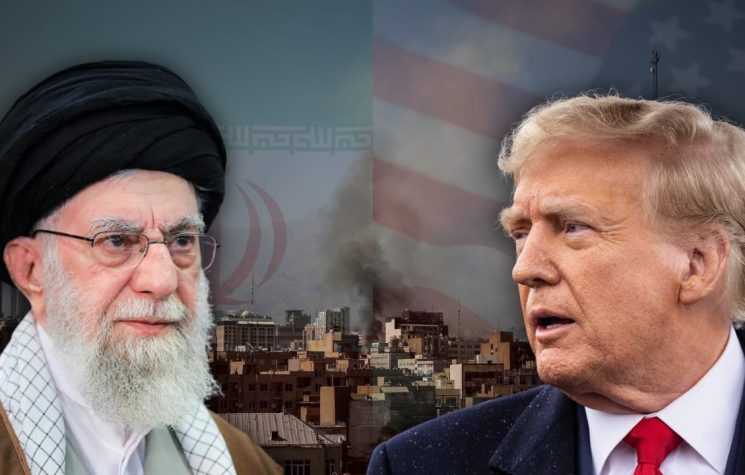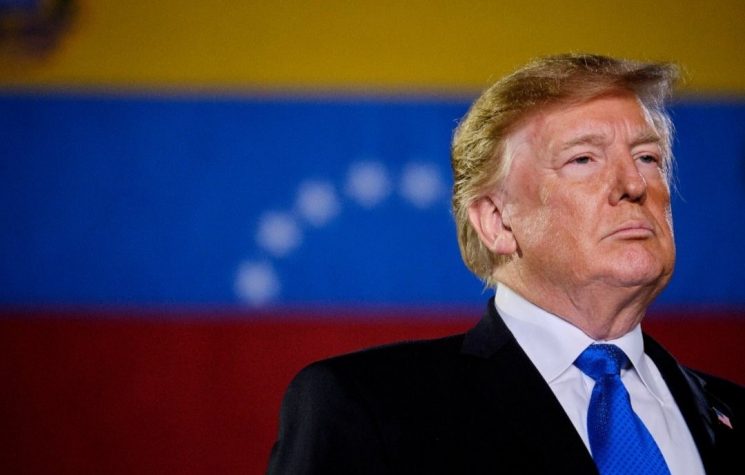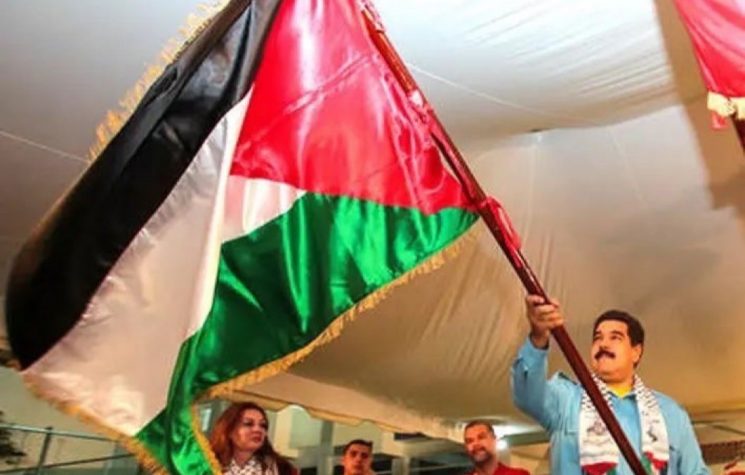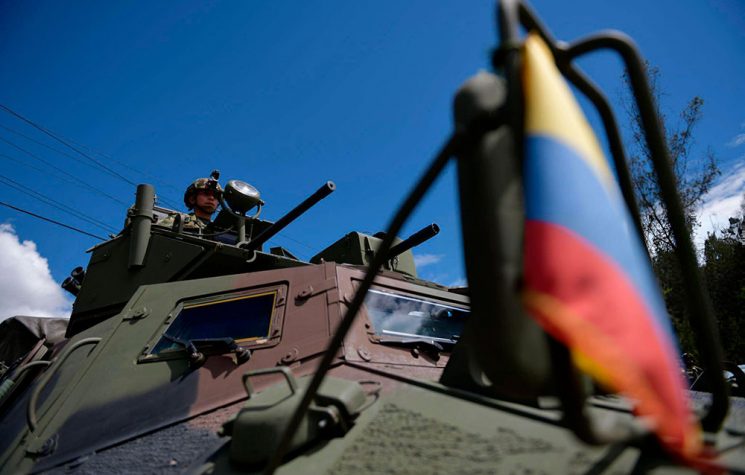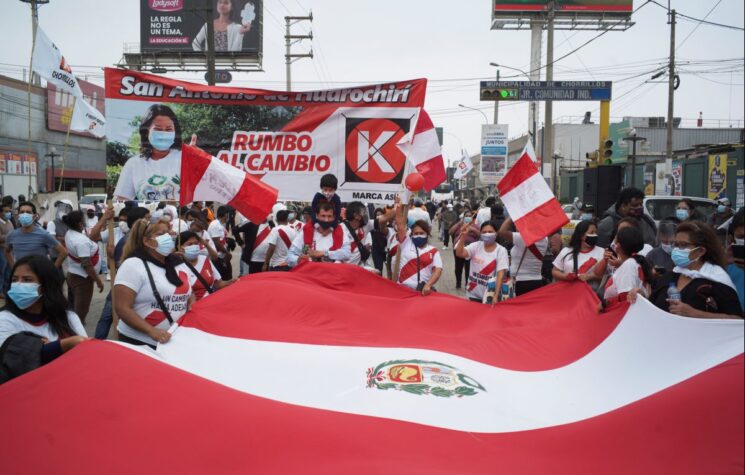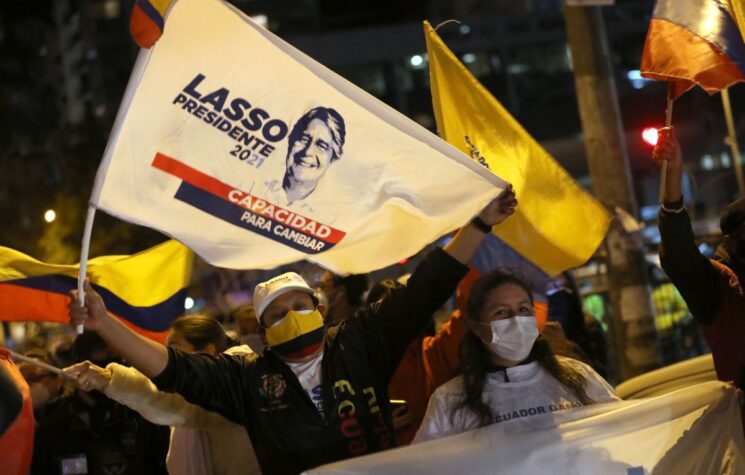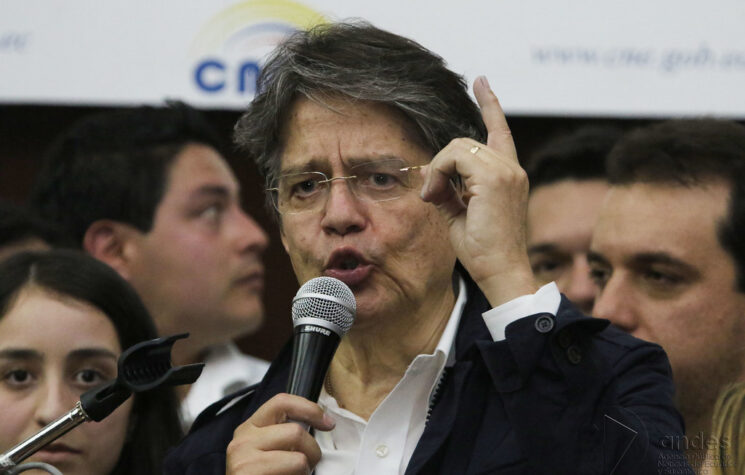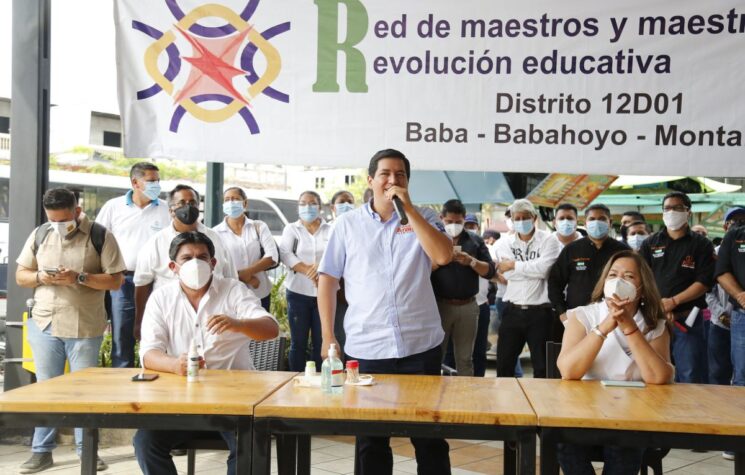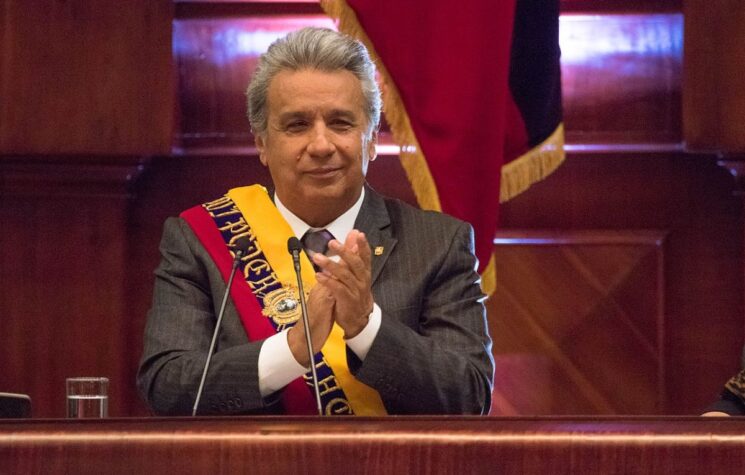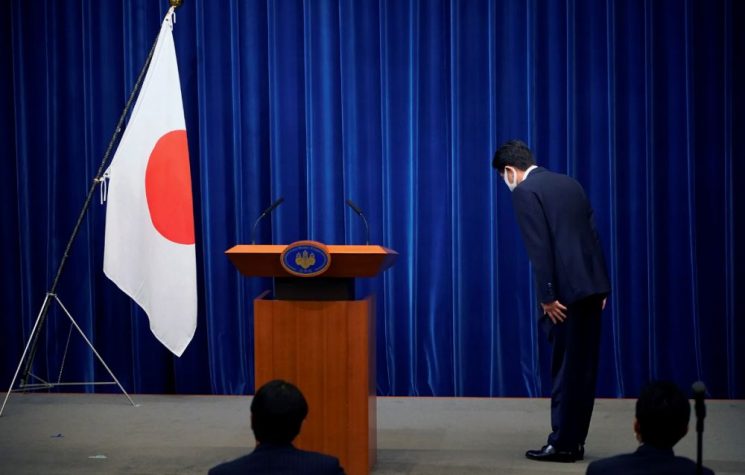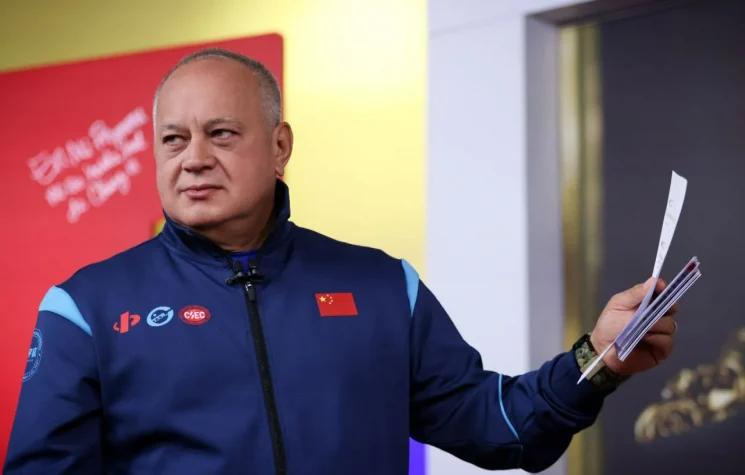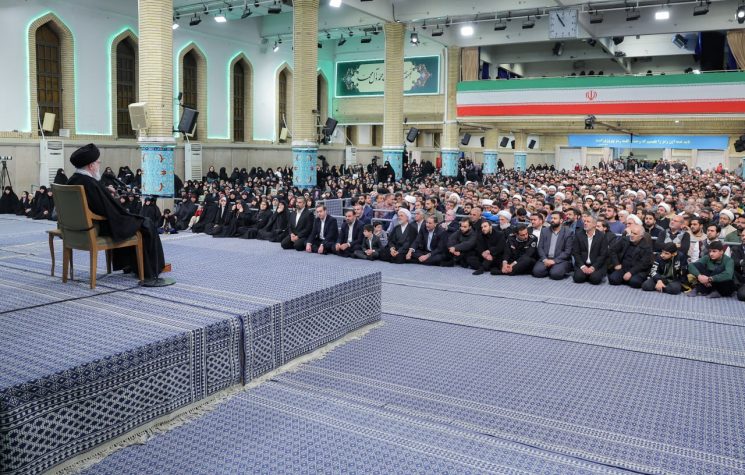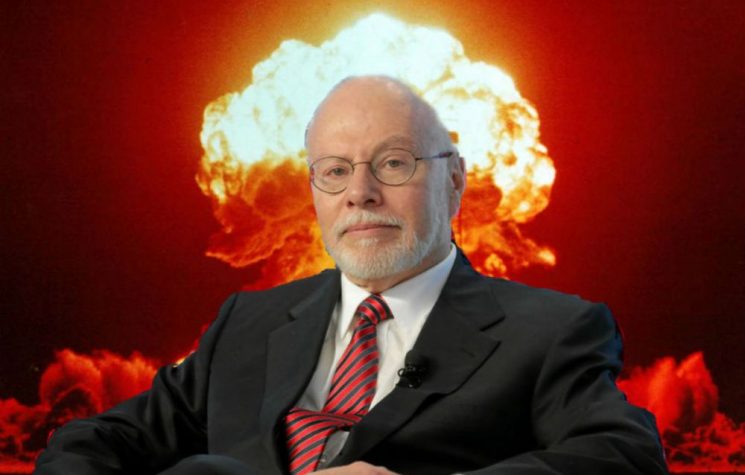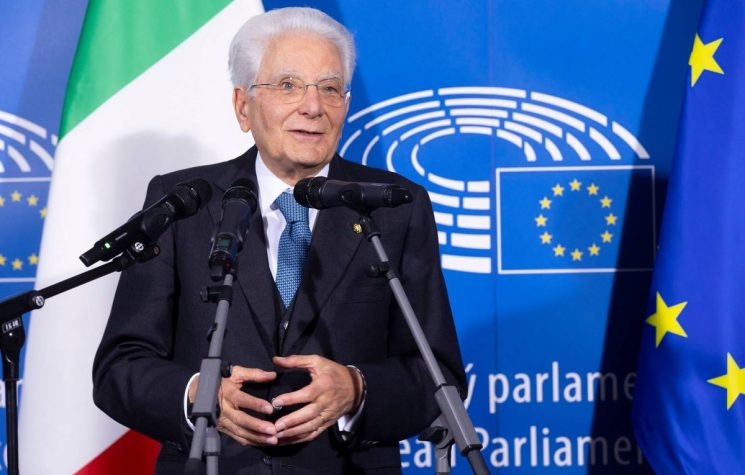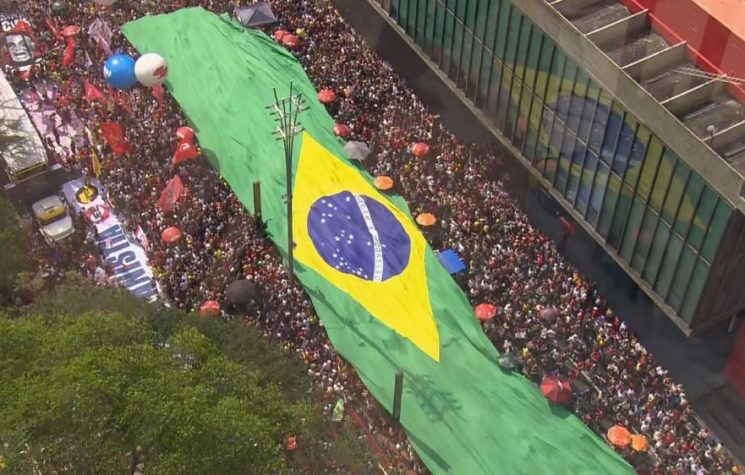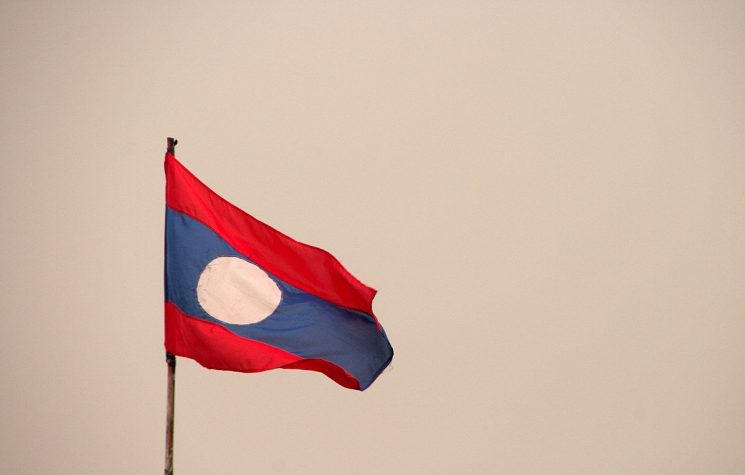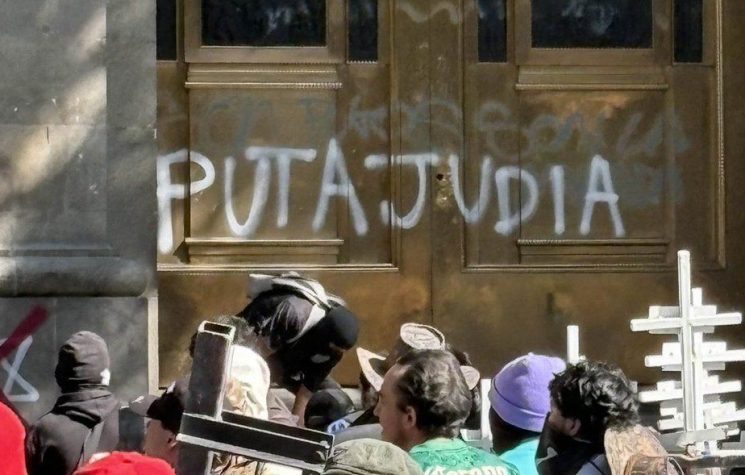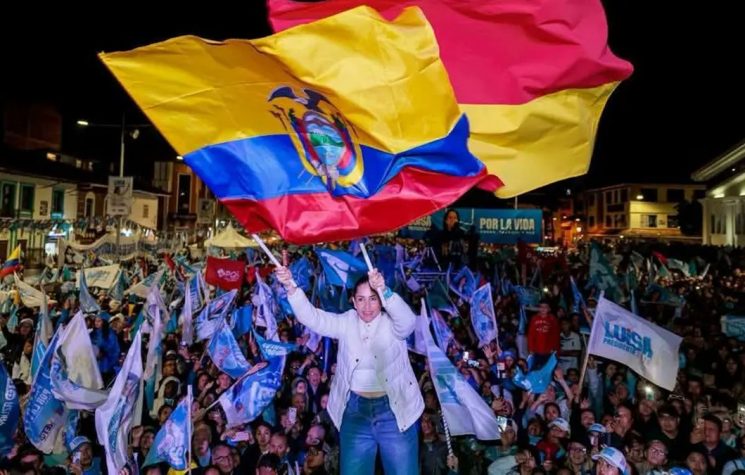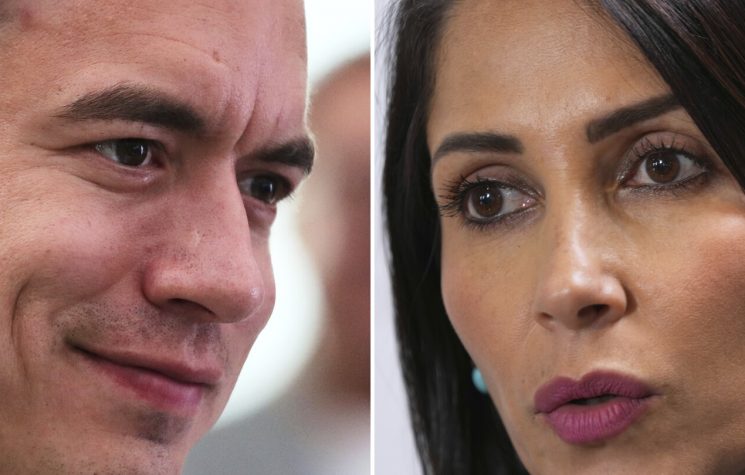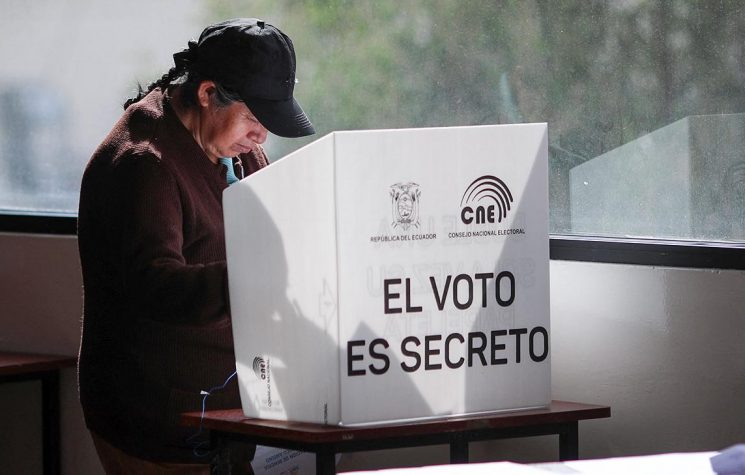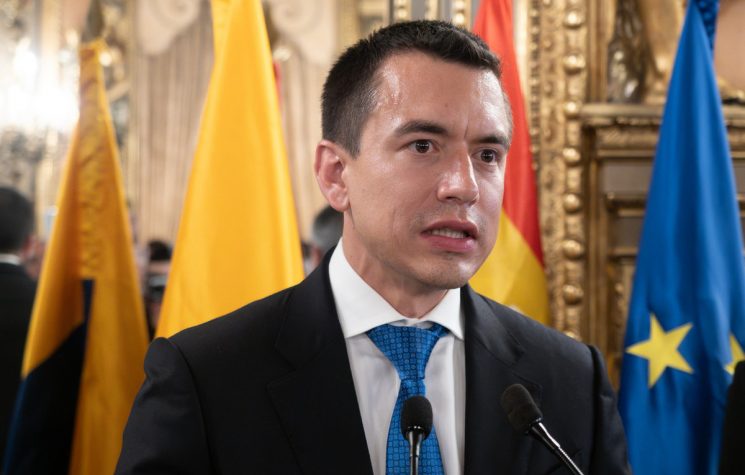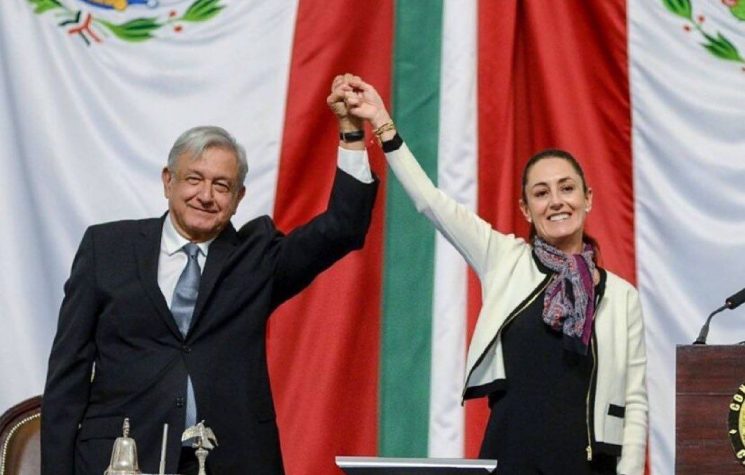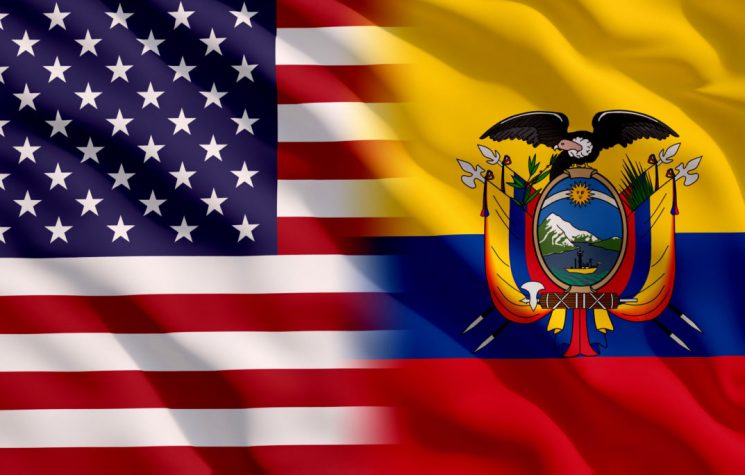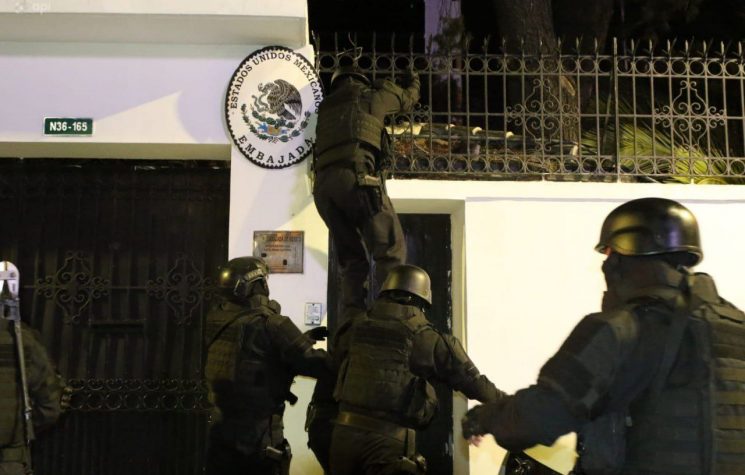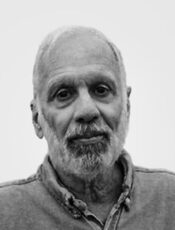If Arauz wins the presidency, he may appoint an important economist and ideologist of the “Citizens Revolution” to a government post, Ron Ridenour writes.
U.S.-backed Lenin Moreno government is trying to stop the new socialistic UNES political party candidate, Andres Arauz, from winning the national elections underway.
Andres Arauz, won first place, 32.7%, on the first round of national elections, February 7. Arauz is the first presidential candidate of UNES, Union of Hope.
Former president Rafael Correa led the formation of this party, Union of Hope (UNES) after he had backed Moreno for president in 2017. Moreno, however, turned against his own party’s program, and went the way of wind blowing from the north.
At first, a U.S.-supported indigenous candidate, Yaku Pérez, took second place with 20.1%, while banker Guerillmo Lasso, also U.S. friendly, came in third with 19.51.
The National Electoral Council (CNE) initial conclusion changed when all the votes were finally counted after four days, and Lasso ended in 2nd place with 19.74 to Pérez 19.38. Lasso and Pérez met privately with the CNE. Pérez claimed fraud and demanded a total recount. Eighty-one percent of 13 million registered voters had cast votes. Ecuador has 17.3 million population; 1.1 million are indigenous people. Second Round in Ecuador Under Threat: Arauz Denounces Moreno Government Interference in Presidential Elections – Orinoco Tribune – News and opinion pieces about Venezuela
Who actually took 2nd place, and will run in the final round, scheduled for April 11, is still undecided due to Pérez fraud accusations, President Lenin Moreno’s government intervention, and outside interference.

Continuous resistance en October 2019, as here in Guayaquil at the beginning forced President Lenin Moreno government to restore fuel subsidies he’d stopped. El Universo newspaper photo.
In August 2020, UNES selected the 35-year old economist Arauz for the presidency. He had been Correa’s Minister of Knowledge and Human Talent (2015-17). He planned for Correa to be his vice-president, but a court denied Correa the right to run for political office.
Arauz had hoped Correa could be his vice-president after he had served as president, 2007-17. However, an Ecuador court disallowed his candidacy given that Correa had been found guilty of corruption and sentenced him to eight years prison, in absentia. Correa was living in Belgium following Moreno turn to the right. From there, he denied any wrongdoing. Ecuador ex-president Correa jailed in absentia for corruption – BBC News
The court found Correa, and 19 other defendants, guilty of accepting $7.5 million from private firms in exchange for state contracts. They were also banned from partaking in politics for 25 years.
UNES chose communicator and political analyst Carlo Rabascall Salazar as its vice-president candidate. In his campaign launch event, he condemned Moreno’s decision to make an advance $2 billion payment on the foreign debt during the peak of the corona pandemic. The funds were taken from public health and education systems. Thousands of health workers were fired during this pandemic. This caused the second highest death rate per capita in the world, after Peru.
The Moreno government had not expected that Arauz could acquire such support. He had sacked the CNE of Correa supporters. Many CNE members are now followers of either Lasso or Pérez. Its president, Diana Atamaint, is a member of Pérez’ party, MUPP (Pachakutik Plurinational Unity Movement).
Founded in 1996, MUPP declared its program to support the interests of Indigenous peoples. Yaku Sacha Pérez Guartambel is the son of campesino parents from the Andean region. He changed his name, Carlos, to Yaku Sacha, “mountain water” in his native language of Kichwa.
Pachakutik is the political arm of the Indigenous confederation CONAIE, which protested against Rafael Correa’s government, and formed an unspoken alliance with the country’s right-wing oligarchs in a bid to destabilize and overthrow the socialist president.
“Pachakutik is closely linked to NGOs funded by Washington and EU member states. The party’s leaders have been trained by the U.S. government-funded National Democratic Institute (NDI), a CIA cutout that operates under the auspices of the National Endowment for Democracy (NED).
“The NED publicly lists more than $5 million in grants for NGOs in Ecuador just in the years from 2016 to 2019. Much of this money has bankrolled anti-Correa opposition groups like Pachakutik and its allies.” How Ecuador’s US-backed, coup-supporting ‘ecosocialist’ candidate Yaku Pérez aids the right-wing | The Grayzone
Following the Lasso-Pérez-CNE private meeting, the CNE decided on a compromise to recount 50% of the votes in 17 of the 24 provinces, singling out provinces where Pérez had done poorly, which raises suspicion of a potential swindle.

Guillermo Lasso presidential candidate. Creative Commons photo.
Guillermo Lasso’s party is the capitalist Creating Creating Opportunities (CREO-PSC). Lasso was the key founder of center-rightest CREO, and stood for its presidency in 2013. CREO combined, in this election, with the Social Christian party (PSC). Founded in 1951, PSC has associate centrist-right parties throughout Latin America and Europe.
Lasso wanted to unite with Pérez to defeat Arauz in the 2nd round. It seemed that Pérez would agree, but then he changed his mind. On February 17, Pérez tweeted a confusing message. After four years of supporting Lasso’s party’s political agenda, close to his own, Pèrez blasted the banker, saying that his indigenous supporters will “never support his corruption”. He claimed that Lasso and even the CNE committed fraud. Ecuador’s Comptroller to Audit Electoral Computer System | News | teleSUR English
U.S., OAS, Colombia, Moreno Intervention
This lay the basis for government intervention. Apparently backing Pérez after he spoke with the U.S. ambassador in Ecuador, Moreno sent in his Comptroller General Pablo Celi. Both Arauz and Lasso rejected the Comptroller’s decision to inspect the National Electoral Council (CNE) computer system. The Network of Electoral Observers also criticized the attempt to affect the electoral calendar with technological excuses.
“Taking copies of the count and recount files is something normal, but taking the computer equipment and impeding the ballot is an attack on democracy,” said Arauz. UNES will send its citizen overseers to scrutinize the process, and the party warned that democracy is under real threat.
“The country needs us united on the same front to make Ecuador a land of opportunities,” Lasso added, rejecting the interference of the Moreno administration in electoral matters.
Ecuador: Indigenous Caravan for Vote Recount Approaches Quito | News | teleSUR English
The CNE stopped its activities after receiving the audit demand from Comptroller Celi. He stated the process should be completed in less than three weeks and should not affect the April 11 ballot.
Ben Norton reports, “The leftist’s overwhelming victory prompted the U.S. State Department, the right-wing government of neighboring Colombia, and the Organization of American States (OAS) to mobilize to prevent him from entering office.” US, OAS, Colombia try to steal Ecuador’s election from popular socialist candidate, while spreading fake news | The Grayzone
The recount will be “overseen by the OAS, which inspired a military coup, November 2019, targeting Bolivia’s elected government.”
“The head of the OAS electoral mission in Ecuador, Isabel de Saint Malo [“Saint Bad” in English] the staunchly conservative former vice-president of Panama, was intimately involved in the US-led coup attempt against Venezuela, working closely with Juan Guaidó and the pro-Washington Lima Group. Guaidó had declared himself president at a news conference without being elected.
“The OAS disseminated lies about Bolivia’s October 2019 election, falsely accusing the government of fraud. Now, the Colombian government is spreading a remarkably similar series of lies about Ecuador’s election and its first-place candidate, Arauz,” Norton wrote.
The Biden administration acting assistant secretary for the State Department’s Bureau of Western Hemisphere Affairs, Julie Chung, tweeted, “U.S. government applauds the February 12 announcement by [CNE] to verify votes in 17 provinces in Ecuador’s February 7 presidential election. This allows the electoral process to advance with enhanced guarantees to the candidates and citizens alike.”
At the same time, Colombia’s right-wing Iván Duque government intervened. It sent its justice department head, Francisco Barbosa, to Ecuador claiming that Arauz had been funded by “Uriel”, a guerrilla leader of the National Liberation Army (ELN). The lie was revealed by linguistic and forensic experts evaluation of a falsified viral video.
Even Colombia’s ex-president, Ernesto Samper (1994-8) warned that his country’s government was in a plot with the OAS to steal Arauz’ electoral victory. On February 13, the liberal wrote:
“I can confirm that these claims are slander and form part of a dirty game that radical right-wing sectors from both countries are organizing, from inside Colombia, to interfere in the second round of the Ecuadorian presidential elections.”
Nevertheless, Ecuadorian right-wing activists have persisted in spreading the fake news.
“While [Moreno’s] government was busy clamping down on the left in Ecuador, Lenin Moreno himself was in the United States. Just two weeks before the election, he visited DC for several days.
Moreno had a series of meetings with powerful figures, including:
- the director for the Western Hemisphere of the US National Security Council, Juan Sebastian Gonzalez, a special assistant to President Joe Biden;
- the secretary general of the Organization of American States (OAS), Luis Almagro, who helped oversee a coup against Bolivia’s democratically elected socialist government in 2019;
- the director of the IMF, Kristalina Georgieva;
- hawkish US Senators Bob Menendez and Ben Cardin;
- and the president of the Inter-American Development Bank, Mauricio Claver-Carone.”
- Ecuador’s historic election explained: Inside the Citizens’ Revolution | The Grayzone
During this election, there were 16 candidates for president/vice-president, and the 137-seat legislature. At first round figures, Arauz’ party would have 49 seats.
Taking fourth place in this election was an alleged social democratic party, Left Democrats. Its candidate, Xavier Hervas, won 15.69% of the vote. When young he was a baker, He studied agricultural engineering and turned capitalist. He publicly proposed forming an alliance with Lasso and Pérez. Lasso agreed, but now with Pérez anti-Lasso twist bets are off.
Alianza PAIS candidate Ximena Peña, the only woman running, garnered only 1.5% of the votes compared with 39%, in the first round of 2017 elections. At that time, the PAIS candidate was Lenin Morena, then supported by Correa. After Morena turned sharply rightest, the party split up. Peña went with Moreno, and Correa forces later formed UNES.
UNES Four-year Objectives
- Justice for life and the reproduction of life
- Participatory and deliberative democratic justice 3.
- Productive and economic justice 4.
- Intergenerational Justice
- Global Justice, sovereignty and integration
- De-colonial, pluri-national and inter-cultural justice
- Ecological Justice and energy transition
- Equal Justice for women and excluded groups
- Digital justice and the new economy
- Cognitive Justice
- Fair and Impartial Justice
Shortly after UNES candidates Arauz-Rabascall won the first round, Moreno sent a bill to the National Assembly aimed to place the Central Bank under the control of private interest groups. Arauz rejects the “defense of dollarization” bill, which would place corporate-sponsored people on the board of directors of the Central Bank of Ecuador.
“If this pro-bankers bill is approved, the next government will not have effective instruments to make positive changes on issues such as credit management,” Arauz said.

Andrés Arauz in Jan. 5, 2020 Insurgente interview. ECUADOR. Entrevista a Andrés Arauz: “Nuestra prioridad en el cortísimo plazo es recuperarnos de la situación económica devastadora” – insurgente.org . Tu diario de izquierdas
Rafael Correa Presidency
Governments preceding Rafael Correa instituted neoliberal austerity and privatization programs, prompting inequality, poverty and unemployment to soar. Ecuador became one of the poorest and least developed nations in the region. Poverty reached 56% of the population. Two million people fled their country between 1998 and 2003.
Ecuador’s Citizens Revolution arose from popular repudiations of neoliberalism and neocolonialism, similar to Chavista Venezuela and Evo Morales’ Bolivia. It did not reject capitalism entirely but redirected government budgets away from the wealthy for social programs and infrastructure investments to benefit the majority.
Rafael Correa’s rule (2007-17) was characterized by a new constitution, which advanced rights of the indigenous peoples; nationalization of oil/gas companies, which would not share profits with the state; large-scale social welfare spending and infrastructure projects, as well as defaulting on foreign loans and tensions with the U.S. government-military-and capitalist companies. Ecuador’s Accomplishments under the 10 Years of Rafael Correa’s Citizen’s Revolution – COHA

Chile President Michelle Bachelet, President Rafael Correa and Minister of Foreign Affairs Ricard Patiño. Creative Commons photo.
William Blum wrote in Killing Hope that the CIA in Ecuador had “infiltrated, often at the highest levels, almost all political organizations of significance, from the far left to the far right.” “In virtually every department of the Ecuadorian government could be found men occupying positions high and low who collaborated with the CIA for money.”
Ecuador was saddled with the U.S.’s largest air base in the region at Manta, which was instrumental in the devastatingly murderous Plan Colombia, and in enforcing international banking and corporate rule over Ecuador. The new constitution of 2009, based upon a referendum, banned all foreign military bases on Ecuadorian soil.
“We can negotiate with the U.S. about a base in Manta, if they let us put a military base in Miami,” Correa quipped. These bases are used to assure U.S. control of other nations’ natural resources, and kicking a base out of the country is often met Washington retaliation. (In 2014, U.S. “defense” department staff was expelled. Ecuador expels US military staff | Ecuador | The Guardian )
A year later, groups of police held violent demonstrations against a law that they claimed cut their benefits. Correa tried to speak to officers at a police barracks, but was physically attacked. After being overcome by tear gas, he was taken to a police hospital where he was basically held captive by police. The Correa government had actually doubled police wages over the past four years. The law would not cut benefits but rather restructure them. This “misunderstanding” was used to rationalize the police protest. Coup in Ecuador thwarted | SocialistWorker.org
“The most extreme attempt at destabilizing Correa’s government came with a violent US-backed coup attempt on September 30, 2010. Defectors from the Ecuadorian police and military occupied the parliament, blocked major streets, took over state institutions, and effectively kidnapped Correa.
“Five people were killed in the attempted putsch, and hundreds were wounded. Ecuador’s opposition nearly succeeded in removing the elected president from power.
“One of the main organizations involved in this coup attempt was the Confederación de Nacionalidades Indígenas del Ecuador (CONAIE). CONAIE is an indigenous organization that advances an ultra-leftist, anarchist-inspired politics that is deeply suspicious of the state and industrial development, even if the government is led by a democratically elected socialist.”
Pachakutik published an open call for Correa to be removed from power, expressing public support for the police and soldiers who had defected. Nevertheless, thousands of ordinary Ecuadorians mobilized to defend him, surrounding the hospital. In front of every police station tires were burned causing smoke to could the sky. Citizens and soldiers freed their president.
Many Indigenous people and alliances were outraged at MUPP and Pérez, and then again when he supported the U.S.-backed military coup in Bolivia in November 2019. When Luis Arce won the October 2020 election numerous Ecuadorian Indigenous leaders were invited to the inauguration but Pérez was not. Pérez had supported the coup. How Ecuador’s US-backed, coup-supporting ‘ecosocialist’ candidate Yaku Pérez aids the right-wing | The Grayzone
Quite similar circumstances to the Ecuadorian coup attempt occurred in Venezuela, on April 11, 2002. Right-wing groups kidnapped President Hugo Chavez, declared a new government, which the U.S. immediately backed. Within 48 hours, thousands of citizens and loyal soldiers freed Chavez.
Yet again, this time in the original “Banana Republic”, Honduras, November 2009. Nobel Peace Prize recipient Barack Obama recognized the military coup as yet another “change of government” when Pentagon’s trained generals overthrew capitalist rancher President Manuel Zelaya. He had become convinced the poor needed better conditions, and ALBA (Bolivarian Alliance for the Peoples of Our America), which he joined, in 2008. History of US intervention in Honduras | Honduras | The Guardian
Hugo Chavez and Fidel Castro had founded ALBA , in 2004, hoping to consolidate regional economic integration based on a vision of social welfare, bartering and mutual economic aid. Correa brought Ecuador into ALBA, in 2009. The alliance has stood firm against U.S. subversion in Latin America, and cultivated relations with Russia, China and Iran.
“Correa rejected IMF and World Bank policies, which had made Ecuador numerous loans to entrap the country in debt, a game plan for Western countries to dominate the global economy. Ecuador’s debt was $14 billion in 1980, the country paid back $7 billion, and it still owed $14 billion. The IMF demanded cuts in wages and state budgets, that 80% of the oil revenues go to debt payment, or it would use international courts to seize their fleet and their contents,” wrote Stansfield Smith, a COHA scholar. Ecuador’s Accomplishments under the 10 Years of Rafael Correa’s Citizen’s Revolution – COHA
Correa renounced one-third of the then existing debt as illegitimate interest. He imposed significant taxes on the rich, including on capital flight. These measures generated $1 billion in revenues in three years. He compelled the Central Bank to repatriate billions in assets held abroad, renegotiated more favorable oil contracts with multi-nationals, which he used to triple investments in infrastructure and public services. Correa diversified the economy so that non-oil exports accounted for two-thirds of export income. These measures enabled Ecuador to earn a 4.2% annual growth from 2007-2015, even during the international financial crisis brought on by Wall Street corruption.
Correa’s government invested $20 billion invested in education, making all education free for everyone. Low-income students are given free school supplies, books, uniforms, and meals. More than 300,000 children who used to have to work have gone back to school.
To preserve Original Peoples’ identity, the government provided new schools in native languages, and fostered public TV and radio stations promoting programs in Quechua and other languages. The 2013 Media Law gave the indigenous communities greater access to community media. By December 2014, 14 radio frequencies, combined with funding and training, have been assigned to each of the country’s indigenous groups.
Ecuador’s minimum wage doubled, from $170 a month to $375, one of the highest in Latin America. Companies cannot pay dividends until all employees earn a living wage. The labor of homemakers, contributing to 15% of the GDP, is now legally recognized. Consequently, 1.5 million homemakers receive social security benefits, including disability compensation and a pension.
Correa invested $16 billion in quality free health care. In the 40 years prior to the Citizens Revolution, not one new public hospital was built in any of the main cities. During Correa’s time, 13 new hospitals were constructed and 18 more were underway. This health system added 34,000 medical professionals. Thanks to free health care (still a dream in the U.S.) and greater access and services, visits to the doctor have almost tripled in ten years.
The United Nations recognizes only eight countries as meeting the two minimum criteria for sustainable development. In the Americas, there are only two, Ecuador and Cuba. Ecuador made major advances in converting to renewable energy, one of the highest percentages of renewable energy (85-95%). By 2015, Ecuador had cut the rate of deforestation in half.
It is now illegal for employers to discriminate due to sexual orientation. Same-sex unions are legal and a gender identity law allows citizens to state on their ID their gender identity instead of the sex given at birth.
Affirmative action laws require companies to reserve 4% of jobs for people with disabilities, and other quotas for minority ethnic groups, indigenous and Afro-descendants.
Four of the five TV channels were owned by the four largest banks. Correa’s government backed a referendum that prohibited banks from owning the media. Airwaves were divided into three groupings: a third private, a third state-owned, and one third for community grassroots outlets. A company cannot own more than one AM station, one FM station and one television station.
During 2016, the nation suffered a recessions due to lower oil prices, and a severe earthquake that cost 668 people’s lives and $3.3 billion in damages. Still, when Correa ended his term the growth rate was 3.3. Poverty had been reduced from 37.6% to 22%.
When Correa won power, the richest 10% accounted for 42 times as much wealth as the poorest 10%. At the end of his terms, the gap was cut in half, one of the most dramatic reductions in inequality in Latin America.
Lenin Moreno
Lenin Moreno came from a left-wing middle class mestizo family. His father, who became a senator, admired Vladimir Lenin and named his son after him. Lenin studied public administration and psychology. In 1998, he was shot in a robbery attempt and lost the ability to walk. He has since used a wheel chair.
Moreno was Correa’s vice-president in his first term (2007-13). On October 1, 2016, Correa introduced his candidacy for the party’s 2017 presidency. Lenín Moreno – Wikipedia
Moreno took first place on the February 19, 2017 election with 39.3% of the vote. He was short by less than one percentage point of outright victory, as Ecuador requires in its two-round electoral system. In the April 2017 runoff, he defeated banker Guillermo Lasso with 51.16% of the vote.
Within months of winning the election, Moreno started moving away from his election platform, thus igniting a feud with ex-president Rafael Correa. Moreno reversed several key pieces of legislation passed by the Correa administration that targeted wealthy individuals and banks. He allowed national and international corporations greater profits with less taxes, and let them mine in areas protected by indigenous people’s ecological base culture.
In February 2019, Moreno announced that he had obtained a loan of more than $10 billion from the International Monetary Fund and the World Bank. Lenín Moreno – Wikipedia
U.S. Special Counsel Robert Mueller’s team investigated a meeting between former Donald Trump campaign chairman Paul Manafort and President Moreno in Quito shortly after he became president. Moreno talked with Manafort about removing WikiLeaks founder Julian Assange from the Ecuadorian Embassy in London and his extradition to the United States. Correa had granted Assange citizenship and political asylum in 2012.
June 2018, Moreno met with Vice President Mike Pence to consolidate “security” measures: buying weapons, radar sets, six helicopters, as well as sharing military training and intelligence. They also spoke about Julian Assange, and in August, Moreno withdrew Ecuador from ALBA.
In January 2019, Moreno supported Venezuelan opposition leader, the self-declared president Juan Gauidó. Soon thereafter, IMF approved a $4.2bn loan for Ecuador. Then the World Bank approved the Social Safety Net Project for Ecuador.
April 11, 2019, Moreno revoked Assange’s citizenship and asylum, allowing British police to drag him in the embassy. Cops threw him in a maximum lock-down prison where he remains. They left his possessions, Wikileaks and legal his documents, which were turned over to U.S. intelligence.
Moreno moved Ecuador’s diplomatic position even closer to U.S. dominance by allowing it to use a military airstrip on the Galápagos Islands. Charles Darwin had studied Galápagos ecosystem, which became an essential part of his Theory of Evolution. Moreno’s government then faced protests from environmentalists after he permitted the U.S. military to use an airbase on Galápagos Islands.
October 2, 2019, Moreno abolished fuel subsidies, sparking the greatest and longest protests in his term. It lost control of the capitol and moved from Quito to Guayaquil. Seven people were killed, and 2,100 arrested. Resistance forced Moreno to restore the subsidies.
Moreno enjoyed a popularity rating as high as 77% shortly after his election in 2017. After the October 2019 Ecuadorian protests, Moreno reached an all-time low approval rate of 7%. He decided not to run again.

Lenin Moreno with Trump, VP Pence, Secretary of State Pompeo as 2021 election campaign unfolds in Ecuador. Creative Commons photo.
Yaku Pérez
Pérez activism is based on limiting mining and fossil fuels. He decided to become a lawyer to fight in court international mining companies from drilling, especially in Indigenous territories. To do so, he has also helped mobilize many people in protests. At the same time, he befriends and supports businessmen, and takes handouts from the U.S. government.
Pérez “supported coups in Bolivia, Brazil, Venezuela, and Nicaragua. Pachakutik and supposedly ‘left-wing’ environmental campaign is being promoted by right-wing corporate lobbyists,” wrote Norton. How Ecuador’s US-backed, coup-supporting ‘ecosocialist’ candidate Yaku Pérez aids the right-wing | The Grayzone
“Corruption ended the governments of Dilma [Rousseff] and Cristina,” Pérez tweeted approvingly. “Now all that’s missing is for Rafael Correa and Maduro to fall. It is just a matter of time.” In another tweet, he wrote that “Arauz is the Maduro of Ecuador.”
“While the Correista candidate Arauz has proposed giving $1000 checks to one million working-class Ecuadorian families, Pérez has attacked the plan on the grounds that poor citizens would ‘spend all the money on beer in one day,’” Norton wrote.
Some Western ecological organizations, however, which do not take on imperialism or support socialism, such as Extinction Rebellion, oppose the socialist and anti-imperialist UNES and support Pérez. Beth Pitts is such a voice. She wrote that the current election pits “the indigenous defender against the former president who jailed him, [providing] a battleground for two opposing ideologies. On one side, an expansion of extractivism and authoritarianism. On the other, a ground breaking move towards a more democratic and ecological future for Ecuador.” Yaku Pérez: The Indigenous Water Defender Who Might be Ecuador’s Next President – Writers Rebel
No doubt the most pertinent conclusion to come to about such contradictions, and within Ecuadorian “Identity Politics” today is how Ben Norton concluded his piece: “The United States is desperate to prevent the socialist wave that washed across Latin America during the first decade of the 21st century from coming back. And in Washington’s bid to stop the tide, ‘eco-socialist’ figures like Yaku Pérez are perfect tools.”

Yaku Pérez with U.S. Amabassador Michael Fitzpatrick. Photos taken from Respaldado por EEUU, el candidato ‘ecosocialista’ de Ecuador, Yaku Pérez, apoya golpes de estado y ayuda a la derecha | The Grayzone
Conclusion
If Arauz wins the presidency, he may appoint an important economist and ideologist of the “Citizens Revolution” to a government post. Ricardo Patiño was Correa’s first minister of economy, then minister of foreign affairs (2010-16), and defense minister at the end. In the early 1980s, he aided a socialist economic direction desired by Nicaragua’s revolutionary Sandinista government.
Washington DC-based Council of Hemispheric Affairs conducted an interview with him on the day of the current Ecuadorian election. He spoke about the “Citizens Revolution” during the time of Correa’s presidency—what went well and what was lacking. COHA Webinar: Ecuadorian Presidential Elections and the comeback of the Citizens’ Revolution – COHA
“We ran a good government from the top but not enough with the people, and that was a serious mistake, which we must correct”, he explained. “Our political process did not sustain the peoples’ movements. We did not prepare our people to carry out the historic movement.” (Quotations may not be the exact words, as I was taking notes during rapid deliveries, but the essence is correct.)
“When Moreno took power and immediately turned his back on our advances, our population did not have enough consciousness and did not mobilize to undo that betrayal,” not for some time. “Many got confused by Moreno’s lies, which the mass media propagated.”
“We [leaders] must [focus on] a systematic structural basis to aid in strengthening social movements to consolidate, to advance, to become historic agents for [fundamental] change.”
Patiño thinks Arauz understands that damage and will seek to repair it. Patiño believe work to broaden the media base, in order to represent peoples’ needs and movements, is one of the first essential tasks of a new government. More cooperative self-production must become incorporated in the infrastructure. Better education of teachers and students should be a priority, as should be much less dependence on foreign companies and their technology. (1)













